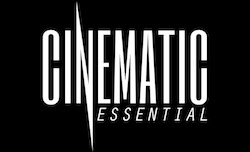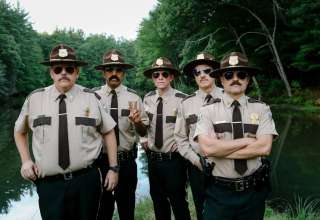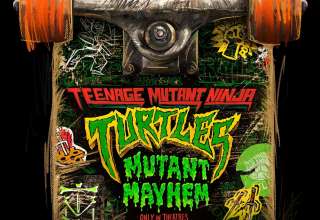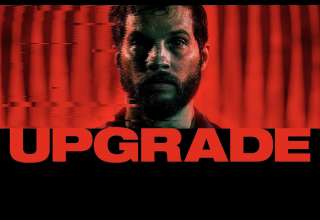One of the most important as well as overlooked positions on a filmmaking team is the screenwriter. You’ll hear enough about everyone else, but you rarely hear anyone talk about the guy who gives everyone else something to work off of. With Stronger, that role had John Pollono, a New England native taking on his first screenwriting job in film. With that being the case, it appears as if he is the least experienced name you’ll see concerning this, but digging further into his history may prove otherwise.
Cinematic Essential: How did you get involved with this project?
John Pollono: You get to know producers and I got to know one of the producers. He was familiar with my work. I started out as a playwright. I had written a bunch of plays that usually take place where I grew up: Massachusetts, New Hampshire. One of the executive producers had seen one and knew the area I was from. And then there was his (Jeff Bauman) book. I had read it and was like, “I grew up a half hour from that.” Obviously, I had an emotional response to the bombing and was compelled by what little bit I read and then I read an advanced copy of the book and realized there was a lot of promise here. He wrote it real quick, but I knew there was a lot more there I could tell between the cracks. I just said here’s what I’d like to do and they said “cool.” Then what you do is you come up with a pitch – for free – and pitch it around. Then we got lucky we found someone who wanted to make it. I met Jeff, talked to him a little bit in prep and then I took a deep dive for like the next year researching and getting to know everybody.
How did you transition from being a playwright to a screenwriter?
I always wanted to work in film. I lived in New York for a while and then moved to L.A. I just took a really weird route. I was an actor and was paying the bills as an actor for a long time. I sort of discovered my voice in theater. The thing is when you write a play, you can rough it out and get it in front of an audience immediately. And they will tell you more about your writing than anything. So I just kept writing all these plays, being in them, producing them and just really shaping my voice. You write a script. Even when it’s done, it’s like two years before you’re sitting in the audience and get that feedback, so theater gave that really good quick loop. And I just got bit by the bug and had some success with it. Then the plays got me attention in terms of film and t.v.
Was there anything in the book that you felt was too personal for the film?
It was actually kind of the opposite. He wrote the book real quick. It had some real uplifting moments, but he was still in the middle of it (dealing with his issues after the bombing). I’m blown away he wrote it when he wrote it. Most of my work was getting everybody to trust me and open up. During the time I knew him, he had his baby while I was there. He was in a transition and it was really kind of weird pushing him as much because it was so fresh for him, but eventually everyone opened up and the story came out. Now, the book was a very important period in his life and I took a lot of stuff from that, but most of the movie is based on the deeper dive and the more raw, personal stories I would hear and that they opened up about.
How did you handle the psychology of it all? Him being in the middle of it.
You write a lot of movies about other stuff and you ask why this. He wanted to do it and I was willing to put that work in and pry. I certainly felt it was a very worthwhile story to tell. As much pain as he was in during the middle of that struggle, he felt people could get a lot of what he did. I really dug Jeff and Erin and his whole family. I grew up right near there so I sort of know that neighborhood so I wasn’t judging it or trying to make caricatures. What I really liked was that Jeff is a really normal guy. He didn’t have a superpower or like stab the terrorists in the throat or anything like that. It was super real. I felt like and he felt like, let’s tell this story. It was really hard to do that, but once we did it felt like an important story to tell. It felt like we had reason to exist.
How difficult was it just to stay truthful to the real story?
I think that’s the biggest challenge of doing a truthful thing. You have to have it structured like a movie. You want to tell a story, and veer it toward the side of truth. Ten people are going to have an experience and ten people are going to have their own versions of it. A lot of times what would happen is I’d pick up the phone and talk to Jeff and say “Tell me some stories?” And then you’d be like, “Oh sh*t! That really clicks into what I’m trying to say.” So it was challenging to stay truthful within it.
How much pressure did you feel trying to make this movie?
Jeff’s an awesome guy. I grew up in the same neighborhood, and we don’t like to sit down and tell our deepest, darkest secrets. I moved out to L.A. and when I was first looking for an apartment, I rolled down my window and was like “Hey, do you know if there are any apartments around here?” And they told me their whole life story. Where I have my best friend that I grew up with who never told me anything. So it’s cut from that clothe. Jeff and the New England tradition. We don’t like to just sit down and go like “Oh, woe is me.” So, I definitely felt a lot of pressure just being from the neighborhood meaning like if this movie didn’t come out right or if it was just sh*tty or if I didn’t show how much we properly loved the Red Sox or whatever, I know everybody I grew up with would be like “You f*cking suck.” And certainly when Patriots Day came out you saw how people had such strong opinions on that. So I was definitely nervous about that but I just had to be as truthful as I could.
Did you get any kind of pushback from Jeff’s family about their portrayal?
I got to know them for so long and I never felt that I would do a movie where they went “That was awesome and entertaining.” I just wanted to create something they felt was truthful and accurate. I think we really did that. And I think that “Hey, listen. I’m going to make a movie about the worst four months of your life” is hard. Jeff got it, but it was so painful and raw with him that I would just ask him a bunch of questions and he would say “you’re the professional. I trust you.” Some of the other family members I did interview and I did get to know were orbiting around a little bit. Yeah, it was hard because they’re human beings and people they know will see it. And again, I had to lean on the side of what was truthful about them. Of course, I have to write dialog and have them say things in a way that it’s going to pop, but still make it work within the character of who they were.
Even still, it has to be a little difficult for people seeing portrayals of themselves on film.
I can imagine seeing a movie about yourself is really, really difficult. And I guess you gotta have a sense of humor and roll with it. You have to tell a good story and go for it. We don’t pull any punches with Jeff and how hard it was for him. Honestly, I feel that would be a disservice. I got to know and interview a ton of amputees and their perspective really rung true with me. They would go “Movies never get things right.” So I was like “What do they never get right?” I had one guy tell me that “When I lost my legs, first time when I took a sh*t at home without nurses, it was like climbing Mt. Everest.” He told me the details and we put that scene in the movie. I asked Jeff about it and he was like “Yeah, that’s right.” I did it so if amputees see this, they’re gonna be like “that’s real.” it’s not flinching from how awful it was and how challenging that transition is.






















